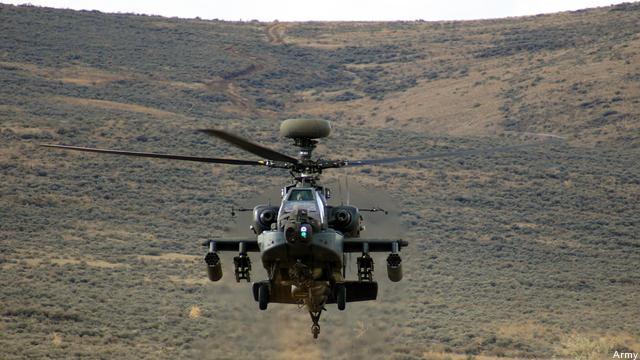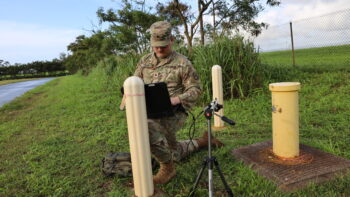 CAPITOL HILL: Congress has asked the Army to explain why it has officially taken delivery of at least seven AH-64E Apache Guardian helicopters that don’t have transmissions installed yet, Breaking Defense has learned. An unidentified subcontractor to Boeing which makes the helicopter, fell behind on building the transmissions and is now trying to catch up, but until it does, the high-tech gunships are unflyable.
CAPITOL HILL: Congress has asked the Army to explain why it has officially taken delivery of at least seven AH-64E Apache Guardian helicopters that don’t have transmissions installed yet, Breaking Defense has learned. An unidentified subcontractor to Boeing which makes the helicopter, fell behind on building the transmissions and is now trying to catch up, but until it does, the high-tech gunships are unflyable.
[Click here for the Army’s response and click here for relevations from Congress]
The Government Accountability Office (GAO) mentioned the Apache transmission issue in one sentence of a 190-page report released last month, as reported by our colleagues at Inside Defense. But the problem remained unfixed as of yesterday, when Hill staff first learned of it during an Army briefing on the service’s 2014 budget. Both Congress and Breaking Defense are now waiting on further explanation from the Army.
“The question is, are they still behind, [and] why would the Army be taking delivery of aircraft that aren’t complete?” one Hill staffer told Breaking Defense. “Normally the government doesn’t sign for an aircraft that is missing a major component, and the contractor doesn’t get paid for it until it’s complete…. Boeing obviously needs to get a handle on this.”
The staffer did not expect the taxpayer to have to bear any additional costs for the helicopters, since Boeing and its subcontractor should pay to install the belated transmission out of their own pockets. The bigger concern is the delay to an important Army program.
We contacted Boeing for comment but haven’t heard back from them yet. We’ll update the story with comment as soon as we get it.
The AH-64 Apache is the vanguard of Army aviation, originally designed to destroy Soviet tanks with long-range missiles but now employed as the heavily armed angel on the shoulder of American ground troops in Afghanistan, where the Taliban have nicknamed it “The Monster.” The Apache entered service in 1984, replacing the Vietnam-vintage Cobra, and has been regularly upgraded since.
According to Program Executive Office (PEO) Aviation spokeswoman Sofia Bledsoe, the Army currently plans to acquire 690 of the latest version, the AH-64E Guardian, by 2027, mostly remanufactured from existing AH-64D Longbows to save money but with 56 built from scratch. Full-rate production begins in 2014, assuming the budget passes, but a few dozen aircraft are already being delivered under what’s called “low-rate initial production” (LRIP). So far, the service has taken delivery of 33 AH-64E Apaches — except that only 26 of those can actually fly because seven lack transmissions.
Hopefully this is just one of the hiccups that afflicts any new military program, even one that builds on three decades of success. (Another problem that GAO mentioned, unspecified “operator concerns” with the new transmission design, has apparently been resolved). The LRIP stage of military procurements, in particular, is notoriously prone to problems — just ask the F-35 Joint Strike Fighter program.
But that the Army is officially signing off on choppers that aren’t actually completed is certainly strange — and given the Army’s often disastrous record of weapons procurements, a little unnerving. We’ll update this story as we learn more from the Army, Boeing, and Congress.
Colin Clark contributed to this story.
Israel signs $583 million deal to sell Barak air defense to Slovakia
The agreement marks the latest air defense export by Israel to Europe, despite its ongoing war in Gaza.


























